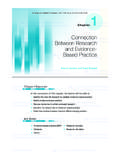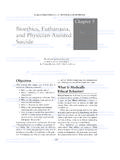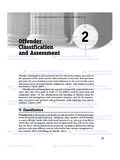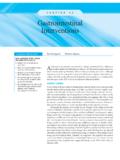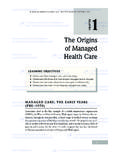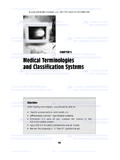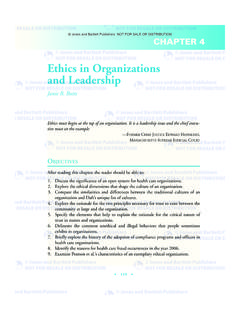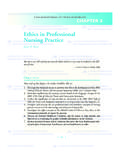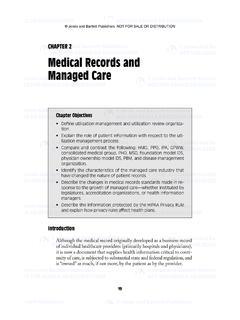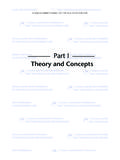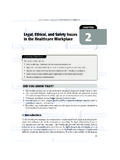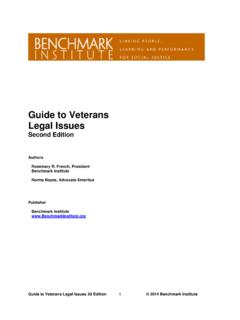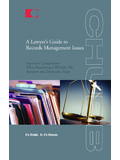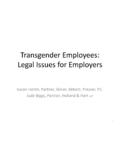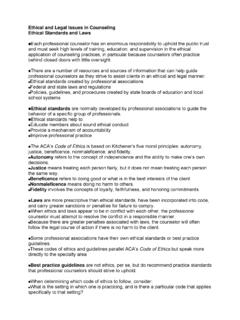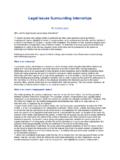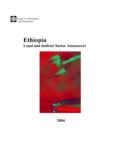Transcription of Right or Wrong: Legal and Ethical Issues and …
1 29 ChapterRight or Wrong: Legal and EthicalIssues andDecision-MakingElizabeth Furlong, PhD, JD, RNNurses make decisions every day that must take into account laws and eth-ical standards. Therefore, in order to make appropriate decisions, nursesrequire an understanding of how laws, ethics, and nursing provides a compelling case study that occurred in Nebraska andunderscores the importance of nurses being constantly aware of chang-ing laws, petition drives, and ballot initiatives. The Nebraska case study,as this case will be called throughout the chapter, shows how Legal andethical factors affect clinical nursing practice and how nurses must con-sider both aspects when making decisions in their the summer and fall of 2006,a group of individuals from states out-side of Nebraska wrote and financially funded a petition drive to ob-tain enough signatures to promote an amendment to the Nebraska state3 Nebraska Case 7/31/07 3:21 PM Page 29 Jones and Bartlett Publishers.
2 NOT FOR SALE OR DISTRIBUTION constitution (Stoddard, 2006). The proposed amendment was titled Nebraskans for a Humane Care Amendment. For the proponents, itwould ensure a Legal mandate that all individuals in Nebraska would nothave medical interventions nor food and water withheld nor with-drawn in terminal conditions. The amendment included a statementthat the proposed amendment would respect advance directives of in-dividuals who had fully expressed language in their advance directiveabout the withholding of food and water in terminal conditions. Theopponents of this petition had the following concerns:1. The initiative was from There was only one or two Nebraskans who had any involve-ment which was a minimal legalistic If passed, the policy would create Ethical dilemmas for patients,family members, and health care providers because the pro-posed amendment mandate did not reflect medical nor ethicalbest practices for patients in terminal The amendment would take decision - making away from parentsabout their children s early September 2006,the Nebraska secretary of state ruled that thepetition organizers had not obtained enough valid signatures to havethe petition put on the November 2006 election ballot (Stoddard,2006).
3 He disqualified many of the signatures that had been obtainedbecause of a variety of reasons and as a result the amendment was noton the ballot for Nebraskans to decide in fall petition organ-izers may, however, attempt to do so in 2008. Thus, while this is not anew mandated policy for patients, family members, nurses, health careproviders,institutions,and other policy and health care actors in thehealth care system, it is an exemplar case of the intersection of Legal andethical aspects within the context of nursing Implications for PracticeHad this amendment to the Nebraska state constitution been placedon the November 2006 ballot and voted on by Nebraskans, successfullypassed,and became law, Nebraskan nurses would have had to follow thelaw or face penalties. Their nursing practice with patients in terminalconditions and their respective family members would have been man-dated by this state constitutional amendment;the state constitution isthe highest law of the state.
4 A nurse who practices in a hospice setting,whether in a hospital,nursing home, or in the home, would be man-dated to continue administration of hydration and nutrition by artifi-cial means even if not based in best practice. In this situation the nursewould be compelled to deliver interventions because of the new30|Chapter 3 Right or Wrong: Legal and Ethical Issues and 7/31/07 3:21 PM Page 30 Jones and Bartlett Publishers. NOT FOR SALE OR DISTRIBUTIONN ebraska state law (Nebraskans for Humane Care Committee, 2006).Thus, one can see the tension in decision - making between making de-cisions based on best practices as in evidence-based practice or decision - making based on the idea of Ethical concerns further complicates the nurse s de-cision- making process in this Nebraska case study. Nurses must bal-ance their decisions based on what evidence-based practice dictates,what the law mandates, and what the Ethical dilemma calls for.
5 For ex-ample, perhaps the patient did not want the administration of hy-dration or nutrition in their particular circumstance but had noexpressed advance directive. Without the latter Legal document, the pa-tient, family, nurse, other health care providers, nor others in the re-spective institution could advocate for what the patient may have a responsibility to follow the American NursesAssociation (ANA) Code of Ethics. The ANA Code of Ethics can befound at the ANA s Center for Ethics and Human Rights Web site In such a situation, nurses may wellfail in their role and responsibility to be advocates for the patient andto advocate for what the patient may have wanted because they fearthe penalty of law. Thus, nurses could be violating their own profes-sional Ethical Nurses Need to Know and DoThe Nebraska case study signifies what nurses need to know and whatnurses need to do in order to be in control of their profession and tobe advocates for their patients.
6 Nurses need to be able to read and un-derstand Legal language in order to analyze how that language will af-fect their practice and conversely their patients. In this case, nurses mustknow the language of the Nebraska Humane Care Amendment, Section30,which says (Nebraskans for Humane Care Committee, 2006):The fundamental human Right to food and water should not bedenied to any person, regardless of race, religion, ethnicity, nativ-ity, disability, age, state of health, gender, or other characteristics:No entity with a Legal duty of care for a person within its custody(including a hospital,orphanage, foster home, nursing home,sanitarium, skilled nursing facility, prison jail, detainment center,corporation, business, institution or individual) may refuse, deny,or fail to provide food and water sustenance and nourishment,however delivered, to any such person if death or grave physicalharm could reasonably result from such withholding and the per-son at risk can metabolize.
7 Any such person so threatened with de-hydration or starvation, any relative of such person, such person sNebraska Case Study| 7/31/07 3:21 PM Page 31 Jones and Bartlett Publishers. NOT FOR SALE OR DISTRIBUTION Legal guardian or surrogate, any public official with appropriatejurisdiction, or any protection and advocacy or ombudsmanagency shall have Legal standing to bring action for injunctiverelief, damages and reasonable attorney s fees to uphold this stan-dard of humane section does not prohibit honoring thewill of any person who, by means of a valid advance directiverecord, has fully expressly, and personally either authorized thewithholding of food or water from himself or herself under spe-cific conditions, or delegated that decision , under specific condi-tions, to one or more relatives or to another person unrelated tothe entity with a Legal duty of is important for nurses not only to be attentive to Legal language andto understand that language but to critically think about how it affectstheir decisions.
8 For example, a critique of the language in the proposedamendment reduces the patient to a biological determinant or to a bio-chemical definition of a human being, especially with the word me-tabolize (Welie, 2006). Aside from the language being reductionisticof a human being, the choice of the word metabolize is incorrect be-cause there is some metabolism after death. It is incongruent with theethical practice of nurses to practice such reductionistic nursing of other language reflects that minors (and their families)would not have any decision - making rights. When nurses analyze po-tential laws that interfere with their ability to deliver quality ethicalcare to patients,they must intervene. Many nurses in Nebraska did ex-actly that by being part of the coalition group that formed in opposi-tion to this proposed most nurses think of laws when the word Legal is evoked,the Nebraska case study educates nurses to another important dimension,which is a petition drive to add an amendment to a state constitution,the highest law of one s state.
9 Further, no state law may be in contradic-tion to constitutional petition drive was promoted by individ-uals and groups outside of Nebraska. A group, America at Its Best, witha postal address in Kalispell, Montana, was responsible for all of the$835,000 funding for the petition drive for the Nebraska Humane CareAmendment (Stoddard, 2006, August 10). The same group providedalmost all of the $861,998 for a second petition drive titled, Stop OverSpending Nebraska, whose purpose was to limit state spending. Of thelatter amount, $1,998 was donated by others than the America at ItsBest group (Stoddard, 2006, August 10). This group listed the follow-ing national organizations as its supporters: Americans for LimitedGovernment, Club for Growth, Funds for Democracy, and the NationalTaxpayers Union. In Nebraska, 113,721 valid signatures or about 10percent of registered voters are needed on a petition ballot for it to bevoted on at an election (Stoddard, 2006, September 19; Stoddard, 2006,32|Chapter 3 Right or Wrong: Legal and Ethical Issues and 7/31/07 3:21 PM Page 32 Jones and Bartlett Publishers.)
10 NOT FOR SALE OR DISTRIBUTIONA ugust 10). The Nebraskans for Humane Care Committee turned in137,200 noted earlier, nurses need to be able to analyze the use of lan-guage by others. Group titles and petition titles can be misleadingand/or mean the exact opposite of what a citizen might think the lan-guage means. Many Nebraskans signed the petition thinking that theproposed amendment was a good thing because the title soundedpositive: Who could be against humane care? Eventually, the Nebraskasecretary of state found the group did not have enough valid signa-tures to put the petition on the ballot; about 20 percent of signatureshad been declared invalid by county election officials (Stoddard, 2006,September 19). Although this was because of a variety of reasons, onevariable will be noted here; individuals who signed were given incor-rect and/or fraudulent information when they were asked to sign thepetition by the petition seekers.
